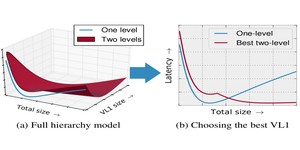Intel's upcoming Haswell architecture, designed to follow on from Ivy Bridge, is rumoured to include L4 cache which can be shared between central processing and graphics processing units for vastly improved 3D performance.
While as-yet unannounced by Intel itself, the claim comes from VR-Zone which claims to have spotted evidence that the Haswell launch line-up will include desktop chips featuring integrated graphics some two or three times faster than the best Ivy Bridge has to offer.
The biggest change, however, comes in the form of a new layer of cache memory. In addition to the usual L1, L2 and L3 cache layers, VR-Zone claims Haswell is to ship with a chunk of L4 cache. Traditionally, such a feature is limited to expensive chips aimed at the high-performance computing (HPC) market.
While Intel certainly has intentions in this area, Haswell's L4 cache is there for a different reason: graphics. Like AMD, its biggest competitor, Intel believes that increased coherency between the graphics and central processing infrastructure on chips is the way forward. While not quite as clear a roadmap as AMD's heterogeneous systems architecture (HSA), Intel's apparent move to add an L4 cache layer to Haswell indicates a similar goal: improved cache coherency between GPU and CPU tasks.
For consumer applications, that means vastly improved graphical capabilities which could mean the death of low- and potentially even mid-range dedicated graphics acceleration hardware. For the server room it means the ability to execute instructions on either the CPU or the GPU independent of where the data is stored, eliminating one of the biggest bottlenecks in general purpose GPU (GPGPU) programming - moving data.
Details of the Haswell chip design are sketchy, and Intel isn't talking. As per usual, the company merely stated that it 'refuses to comment on rumour or speculation regarding unannounced products.' Should VR-Zone's guess prove accurate, however, Intel's integrated graphics could be getting a serious speed boost come Haswell's launch in 2013.
While as-yet unannounced by Intel itself, the claim comes from VR-Zone which claims to have spotted evidence that the Haswell launch line-up will include desktop chips featuring integrated graphics some two or three times faster than the best Ivy Bridge has to offer.
The biggest change, however, comes in the form of a new layer of cache memory. In addition to the usual L1, L2 and L3 cache layers, VR-Zone claims Haswell is to ship with a chunk of L4 cache. Traditionally, such a feature is limited to expensive chips aimed at the high-performance computing (HPC) market.
While Intel certainly has intentions in this area, Haswell's L4 cache is there for a different reason: graphics. Like AMD, its biggest competitor, Intel believes that increased coherency between the graphics and central processing infrastructure on chips is the way forward. While not quite as clear a roadmap as AMD's heterogeneous systems architecture (HSA), Intel's apparent move to add an L4 cache layer to Haswell indicates a similar goal: improved cache coherency between GPU and CPU tasks.
For consumer applications, that means vastly improved graphical capabilities which could mean the death of low- and potentially even mid-range dedicated graphics acceleration hardware. For the server room it means the ability to execute instructions on either the CPU or the GPU independent of where the data is stored, eliminating one of the biggest bottlenecks in general purpose GPU (GPGPU) programming - moving data.
Details of the Haswell chip design are sketchy, and Intel isn't talking. As per usual, the company merely stated that it 'refuses to comment on rumour or speculation regarding unannounced products.' Should VR-Zone's guess prove accurate, however, Intel's integrated graphics could be getting a serious speed boost come Haswell's launch in 2013.

MSI MPG Velox 100R Chassis Review
October 14 2021 | 15:04









Want to comment? Please log in.